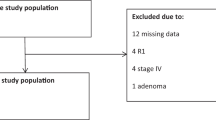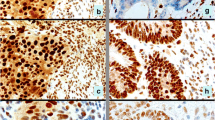Abstract
Purpose
Microsatellite instability (MSI) and chromosomal instability are main mechanisms underlying colorectal carcinogenesis. We determined the features and prognosis of colorectal cancer based on MSI including mismatch repair genes and expression of p53.
Methods
Between 1999 and 2008, a total of 2,649 colorectal cancer patients were analyzed using a prospective database. A mismatch repair defect (MMR-D) was defined as a loss of expression of more than one MMR protein and/or MSI-high. MMR-proficiency (MMR-P) was defined as expression of all MMR proteins and microsatellite stable (MSS)/MSI-low. Groups 1 (G1), 2 (G2), 3 (G3), and 4 (G4) were defined as MMR-D and p53-positive expression, MMR-D and p53-negative expression, MMR-P and p53-positive expression, MMR-P and p53-negative expression, respectively.
Results
Eighty-two (3.0 %), 181 (6.8 %), 1,368 (51.7 %), and 1,018 (38.5 %) patients were classified into groups 1–4, respectively. Comparison between G1 and G2 showed differences in location (p < 0.001), size (p = 0.030), node metastasis (p = 0.027), distant metastasis (p = 0.009), and stage (p = 0.040). Comparison between G3 and G4 showed differences in location (p < 0.001) and histology (p < 0.001). Comparison between G1 and G3 showed differences in location (p < 0.001) and histology (p < 0.001). Comparison between G2 and G4 showed differences in age (p < 0.001), location (p < 0.001), size (p = 0.006), histology (p < 0.001), node metastasis (p < 0.001), distant metastasis (p < 0.001), and stage (p < 0.001). On multivariate analysis, stage (p = 0.007) and histology (p < 0.001) were associated with improved overall survival, and stage (p < 0.001) was associated with disease-free survival.
Conclusions
According to the MSI and p53 subsets, colorectal cancers showed different clinicopathologic features, but these subsets had no prognostic impact on overall and disease-free survival rate.

Similar content being viewed by others
References
Rodriquez J, Frigola J, Vendrell E, et al. Chromosomal instability correlates with genome-wide DNA demethylation in human primary colorectal cancers. Cancer Res. 2006;66:8462–8.
Smith G, Carey FA, Beattie J, et al. Mutations in APC, Kirsten-ras, and p53—alternative genetic pathways to colorectal cancer. Proc Natl Acad Sci USA. 2002;99:9433–8.
Söreide K, Janssen EAM, Söiland H, Körner H, Baak JP. Microsatellite instability in colorectal cancer. Br J Surg. 2006;93:395–406.
Clark AJ, Barneston R, Farrington SM, Dunlop MG. Prognosis in DNA mismatch repair deficient colorectal cancer: are all MSI tumours equivalent? Fam Cancer. 2004;3:85–91.
Samowitz WS, Curtin K, Ma KN, et al. Prognostic significance of p53 mutations in colon cancer at the population level. Int J Cancer. 2002;99:597–602.
Walther A, Johnstone E, Swanton C, Midgley R, Tomlinson I, Kerr D. Genetic prognostic and predictive markers in colorectal cancer. Nat Rev Cancer. 2009;9:489–99.
Ogino S, Goel A. Molecular classification and correlate in colorectal cancer. J Mol Diagn. 2008;10:13–27.
Munro AJ, Lain S, Lane DP. p53 abnormalities and outcomes in colorectal cancer: a systematic review. Br J Cancer. 2005;92:434–44.
Hendriks Y, Franken P, Dierssen JW, et al. Conventional and tissue microarray immunohistochemical expression analysis of mismatch repair in hereditary colorectal tumors. Am J Pathol. 2003;162:469–7.
Rashid A, Zahurak M, Goodman SN, Hamilton SR. Genetic epidemiology of mutated K-ras proto-oncogene, suppressor genes, and microsatellite instability in colorectal adenomas. Gut. 1999;44:826–33.
Lawes DA, Pearson T, Sengupta S, Boulos PB. The role of MLH1, MSH2 and MSH6 in the development of multiple colorectal cancers. Br J Cancer. 2005;93:472–7.
Hatch SB, Lightfoot HM Jr, Garwacki CP, et al. Microsatellite instability testing in colorectal carcinoma: choice of markers affects sensitivity of detection of mismatch repair-deficient tumors. Clin Cancer Res. 2005;11:2180–7.
Rigau V, Sebbagh N, Olschwang S, et al. Microsatellite instability testing in colorectal carcinoma: the comparison of immunohistochemistry and molecular biology suggests a role for hMLH6 immunostaining. Arch Pathol Lab Med. 2003;127:694–700.
Sinicrope FA, Rego RL, Halling KC, et al. Prognostic impact of microsatellite instability and DNA ploidy in human colorectal carcinoma patients. Gastroenterology. 2006;131:729–37.
Mead LJ, Jenkins MA, Young J, et al. Microsatellite instability markers for identifying early-onset colorectal cancers caused by germ-line mutations in DNA mismatch repair genes. Clin Cancer Res. 2007;13:2865–9.
Lim SB, Jeong SY, Lee MR, et al. Prognostic significance of microsatellite instability in sporadic colorectal cancer. Int J Colorectal Dis. 2004;19:533–7.
Kim YH, Min BH, Choi HK, et al. Sporadic colorectal carcinomas with low-level microsatellite instability in Korea: do they form a distinct subgroup with distinguished clinicopathological features? J Surg Oncol. 2009;99:351–5.
Jung SH, Kim HC, Kim JS, Choi J, Yu CS, Kim JC. Efficacy of hMLH1/hMSH2 immunohistochemical staining as representative index for microsatellite instability status in sporadic colorectal cancer. J Korean Soc Coloproctol. 2006;22:184–91.
Thibodeau SN, French AJ, Cunningham JM, et al. Microsatellite instability in colorectal cancers: different mutator phenotypes and the principal involvement of hMLH1. Cancer Res. 1998;58:1713–8.
Ashktorah H, Smooth DT, Carethers JM, et al. High incidence of microsatellite instability in colorectal cancer from African Americans. Clin Cancer Res. 2003;9:1112–7.
Tomlinson IP, Ilyas M, Bodmer WF. Allele loss occurs frequently at hMLH1, but rarely at hMSH2 in sporadic colorectal cancer with microsatellite instability. Br J Cancer. 1996;74:1514–7.
Kuismanen SA, Hoimberg MT, Salovaara R, de la Chapelle A, Peltomäki P. Genetic and epigenetic modification of MLH1 accounts for a major share of microsatellite-unstable colorectal cancers. Am J Pathol. 2000;156:1773–9.
Parc Y, Gueroult S, Mourra N, et al. Prognostic significance of microsatellite instability determined by immunohistochemical staining of MSH2 and MLH1 in sporadic T3N0M0 colon cancer. Gut. 2004;53:371–5.
Poynter JN, Siegmund KD, Weisenberger DJ, et al. Molecular characterization of MSI-H colorectal cancer by MLH1 promoter methylation, immunohistochemistry and mismatch repair germline mutation screening. Cancer Epidemiol Biomarkers Prev. 2008;17:3208–15.
Kakar S, Burgart LJ, Thibodeau SN, et al. Frequency of loss of hMLH1 expression in colorectal carcinoma increases with advancing age. Cancer. 2003;97:1421–7.
Iacopetta B. TP53 mutation in colorectal cancer. Hum Mutat. 2003;21:271–6.
Russo A, Bazan V, Iacopetta B, Kerr D, Soussi T, Gebbia N. The TP53 Colorectal Cancer International Collaborative Study on the prognosis and predictive significance of p53 mutation: influence of tumor site, type of mutation, and adjuvant treatment. J Clin Oncol. 2005;23:7518–28.
Samowitz WS, Holden JA, Curtin K, et al. Inverse relationship between microsatellite instability and K-ras and p53 gene alteration in colon cancer. Am J Pathol. 2001;158:1517–24.
Elsaleh H, Powell B, McCaul K, et al. p53 alteration and microsatellite instability have predictive value for survival benefit from chemotherapy in stage III colorectal carcinoma. Clin Cancer Res. 2001;7:1343–9.
Cripps KJ, Purdie CA, Carder PJ, et al. A study of stabilization of p53 protein versus point mutation in colorectal carcinoma. Oncogene. 1994;9:2739–43.
Dix B, Robbins P, Carrello S, House A, Iacopetta B. Comparison of p53 gene mutation and protein overexpression in colorectal carcinoma. Br J Cancer. 1994;70:585–90.
Veloso M, Wrbra F, Kaserer K, et al. p53 gene status and expression of p53, mdm2, and p21Waf1/Cip1 proteins in colorectal cancer. Virchows Arch. 2000;437:241–7.
Laghi L, Bianchi P, Malesci A. Differences and evolution of the methods for the assessment of microsatellite instability. Oncogene. 2008;27:6313–21.
Jones AM, Douglas EJ, Halford S, et al. Array-CGH analysis of microsatellite-stable, near-diploid bowel cancers and comparison with other types of colorectal carcinoma. Oncogene. 2005;24:118–29.
Burgart LJ. Testing for defective DNA mismatch repair in colorectal carcinoma: a practical guide. Arch Pathol Lab Med. 2005;129:1385–9.
Acknowledgment
This research was supported by Basic Science Research Program through the National Research Foundation of Korea (NRF) funded by the Ministry of Education, Science and Technology (2010-0016765). We thank Sun Woo Kim, Sook Young Woo, and Jung Hyeon Ahn of the Biostatistics Team, Samsung Biomedical Research Institute, for the statistical analysis of this study.
Author information
Authors and Affiliations
Corresponding author
Rights and permissions
About this article
Cite this article
Kim, H.R., Kim, H.C., Yun, HR. et al. An Alternative Pathway in Colorectal Carcinogenesis Based on the Mismatch Repair System and p53 Expression in Korean Patients with Sporadic Colorectal Cancer. Ann Surg Oncol 20, 4031–4040 (2013). https://doi.org/10.1245/s10434-012-2455-7
Received:
Published:
Issue Date:
DOI: https://doi.org/10.1245/s10434-012-2455-7




